Indoor air pollution is a huge health hazard. People who are particularly vulnerable to this issue include young children, elderly adults, and those with existing heart or lung conditions--who often stay inside even more frequently.
Unfortunately, outdoor air pollution gets the most attention from local communities; however, studies by the Environmental Protection Agency (EPA) have revealed that levels of pollutants indoors can be two to five times higher than outdoors.
The good news is that HVAC technology provides us with several means for protecting ourselves against poor IAQ (indoor air quality). How can your HVAC system improve your indoor air quality?

1. Improve Ventilation Throughout Your Home or Office
A well-conceived ventilation system can be a lifesaver, providing fresh air, diminishing odors, and eliminating potentially dangerous contaminants. Exhaust fans prove to be incredibly helpful in reducing the concentration of virus particles that can otherwise compromise indoor air quality. Besides this, other techniques such as relocating intakes or adding HVAC technology like make-up units are also great ways to enhance ventilation.
2. Use Your HVAC System To Control Your Humidity
It's no secret that high relative humidity and low temperatures can have a serious impact on indoor air quality. Mold loves moist environments, while viruses thrive in dry conditions. To keep your environment healthy, you need to monitor both temperature and humidity levels with precision.
One way of achieving this goal is by investing in Variable Refrigerant Flow (VRF) systems; these are zoned HVAC technologies designed to maintain consistent temperatures and relative humidity levels over time. By keeping an eye on things with a handy gauge, you're well on your way to improving your home or workplace's air quality!
3. Invest in Better Filters
Invest in high-efficiency particulate air (HEPA) filters - they trap an impressive 99.97% of particles including smoke, pollen, and dirt. And the best part? HEPA filters come with ratings on the minimum efficiency reporting value (MERV) scale that measures their effectiveness at blocking out different sizes of particles; so look for one between 17-20! That's far better than what everyday AC/furnace filters can offer – typically 8 or lower on MERV scales.

Call Bluflame Service Co for Toledo Heating and Air Conditioning Help Today!
If you are looking for new furnace repair Toledo, new heating Toledo, or help with your AC system, look no further than our techs! Call us today to schedule an appointment!
Sources:-
https://aristair.com/reduce-indoor-air-pollution-hvac/
https://www.epa.gov/report-environment/indoor-air-quality#importance
